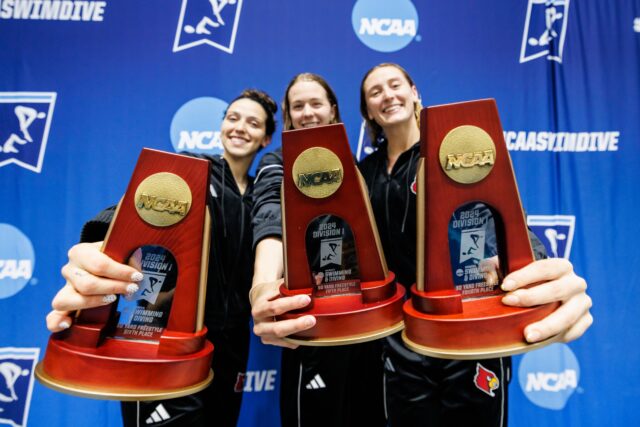By Braden Keith on SwimSwam

The hottest topic of conversation at this week’s College Swimming & Diving Coaches Association of America was the existential dread over the future of the sport in a rapidly-evolving collegiate athletics landscape.
But the conversation is not all doom-and-gloom. Coaches are looking for NCAA Championship reform in an effort to increase the relevance and exposure of swimming.
Among the ideas that were floated are pushing the meets back to ealry April, moving it up to early February, or making college swimming a fall-only sport, leaving the spring to long course and international competition.
ESPN, which owns the rights to televise and stream the NCAA Championship meets through at least the 2031-2032 season, will be a major driver of any decision to change the schedule.
Louisville head coach and CSCAA board member Arthur Albiero spoke to the fact that athletics directors have told the CSCAA that swimming doesn’t have exposure, and that a lack of exposure limits the sport’s importance to the athletics department.
That lack of exposure is largely driven by the meets overlapping with the NCAA basketball tournaments. Historically the conflict has been with the men’s basketball tournament, but in recent years also the women’s tournament as well as Caitlin Clark, Angel Reese, Paige Bueckers, and the South Carolina women, among others, have dramatically raised the profile of the women’s basketball tournament (which had higher championship television ratings than the men’s tournament this year).
A review of the press seating at the NCAA Swimming & Diving Championships throughout the years has revealed as many laptop screens tuned into basketball games as swimming statistics.
But in the conflict comes opportunity. The women’s basketball tournament, gymnastic championships, and softball and volleyball tournament shows that there is increasing interest across the country in sports outside of the traditional “big two” of college athletics, especially in women’s sports. If swimming can shift outside of those overlapping windows, there is a chance to prove the sport’s relevance to a broader audience.
We don’t know that this will work. There’s so much change coming to college athletics, that the uncertainty of the future is endless. Putting swimming in the best position to thrive in the new environment, though, will be the key to its future.
SwimSwam: The Pulse: NCAA Championship Reform Is the Hottest Topic at this Week’s CSCAA Convention


















You must be logged in to post a comment Login